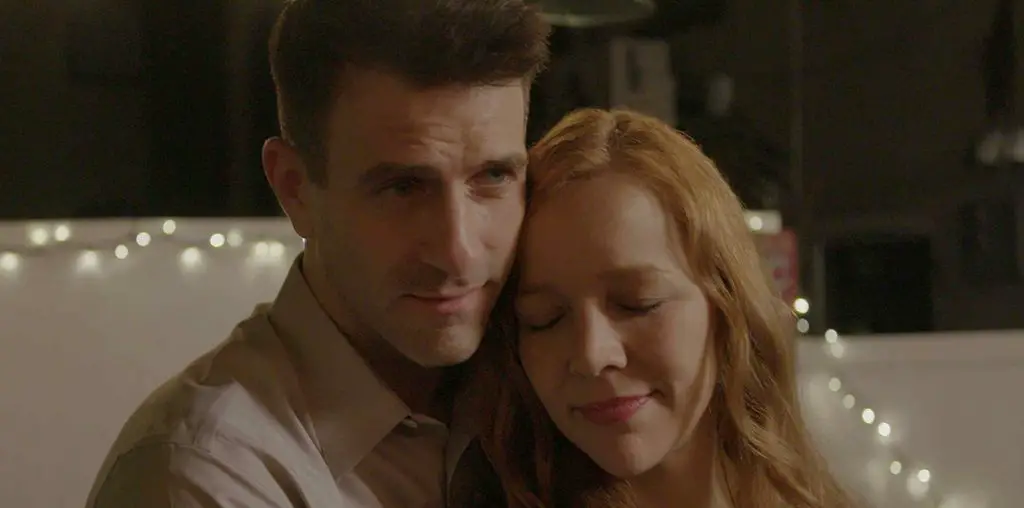
It is no small exaggeration to claim Daniel J. Pico’s adaptation of David Bianchi’s performance piece “Soldier” is among the finest experimental short films ever made. Yes, ever made. Clocking in at a mere 10 minutes, the film packs a wallop of such acute power that it is impossible not come out this relatively brief experience in an advanced state of devastation.
The set-up of “Soldier” is deceptively simple. Bianchi stands with a half-dozen others representing the demographics of today’s U.S. Army. All are in battle fatigues. They march in place before a white sheet to a staccato rhythm provided by Bianchi in his lacerating delivery of his poetic vision of today’s modern warrior which he describes as having “the heart of a lion/a species of carnivorous kingdom come” and the appearance of “the tan color of the modern day Jehovah.”
But the march and bravado are interrupted with the response of the “disintegrating scream of shrapnel to your head.” The off-screen burst of enemy fire leaves its mark – one soldier goes down as a gash of blood cuts across the white screen.
Then hell breaks loose as the soldiers behind Bianchi are gunned down, one by one. A limb is severed, a face is shattered, blood is suddenly everywhere. And Bianchi, his words racing like an ambulance through the carnage and chaos of war, describes the madness around him:
“The heavy pants and arrested breaths that rise and fall – the skeletons chest –
The coughs blood mess that muddles the breath
The phlegm to flood the windpipe to the chest
Blood temperature drops an arteries popped
A squish of blood with every heart throb,
The body convulse
A lowering pulse
The neck loses coordination unable to support the skull.”
More shots, more blood. Bianchi ponders the fallen, wondering if circumstances had been different for all involved:
“You wish of better times you might have known this man – this boy – this friend
Maybe you could have been lying on the beach watching voluptuous vixens frolicking through the sand while drinking tonic and gin
Maybe you could have been classmates sharing thoughts and hypothesis on the latest bio-chemistry exam
Or at the local pool hall discussing the latest fad
Or he could be the best friend to call when you’re apathetic and sad
Maybe roommates – post graduate dad’s – enjoying a day at Disney with the wife and kids and a bottle of Carlsbad
But the last place you want to be is strapping a tourniquet to his neck in Baghdad
But the last place you want to be is strapping a tourniquet to his neck in Baghdad”
Throughout the commotion, a mysterious figure is intercut chanting the 18th century folk song “Johnny I Hardly Knew Ya,” which recalls the fate of a maimed soldier who returns from war and is put into the street to beg for money. (One doesn’t need a mathematics degree to add the two and two here and come up with a slam against how the American government isn’t helping its wounded veterans receive the fullest support they deserve.)
At the end, though, comes the killer punch. Bianchi holds a fallen comrade and yells skyward:
“He’s only 18 years old…
And in your arms you can’t help yourself from crying—
In a rage of emotion you grab his fatigues and beg him to please stop dying!
But in the milliseconds that die in half life’s that feel like crossing light year milky ways his head tilts back to it’s final resting place on your shoulder.
With his name to be carved and epitaphed on a withered weathered monument in Washington D.C. – Well he might as well just be another unknown soldier.
And in a fragile moment you shriek and refute the skies!
Scuff and quaff this discipline – this identity – this comradery – this killing an unknown enemy – this fight for territory marked by imaginary boundaries.
But bullets burn by blaze the sky and you realize it’s over—
And the empty cries of a million lives scream”
As for that white sheet. The blood has spattered a pattern that…well, to give that away would dilute the imagination and anger of “Soldier,” which is both a tribute to those very young people who sacrifice themselves for their country and a bitter condemnation of a morally corrupt leadership that talks about sacrifice while taking five week vacations.
Pico’s direction of “Soldier” is heavily theatrical – it literally starts and concludes with stage lights. Yet the theatrical trappings work to its full advantage. This is clearly a piece of performance art, not neo-realism, yet when the blood starts pouring and the soundtrack is full of gunfire, one can gain a greater understanding of today’s Baghdad then from the curiously sanitized TV news broadcasts originating from the Iraqi capital.
“Soldier” is raw, visceral, furious and brilliant. Pico and Bianchi have crafted a perfect film. I wish every American would see “Soldier” – especially those who voted to send America’s youth into the Iraq slaughterhouse.
